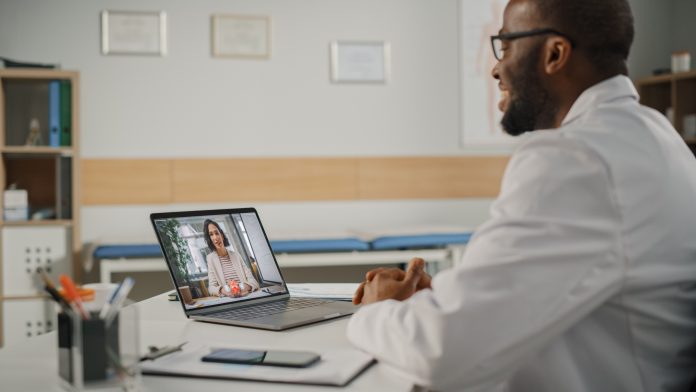As virtual wards become more prevalent, technology-enabled care solutions will become increasingly important. Kelly Bevington, Principal Category Manager for IT and Digital Procurement Frameworks at NHS Shared Business Services (NHS SBS), explains remote patient monitoring solutions
Amongst the many legacies left by the coronavirus pandemic is a backlog of patient appointments, likely to continue for some time – but, remote patient monitoring solutions could help!
With 19 out of 20 hospital beds taken and 14,000 being occupied by someone clinically ready to leave but unable to be discharged to the appropriate care setting, NHS England (NHSE) has, in its delivery plan for recovering urgent and emergency care services, stated its ambition to “improve to 76% of patients being admitted, transferred or discharged within four hours by March 2024”.
The plan sees virtual wards as important in expanding capacity by joining-up health and care outside the hospital.
Virtual wards combine technology and remote monitoring with advice, diagnostics, and treatment to allow hospital-level care at the patient’s place of residence.
Designed to replace admissions and facilitate discharges, they are considered a safe and efficient alternative to hospital care, particularly for frail and elderly patients.
Some of the core technology-enabled care (TEC) solutions facilitating virtual wards and care include:
Remote clinical monitoring solutions
Remote clinical monitoring platforms and services connect to vital sign devices that aid in the monitoring, reporting, and analysing of a patient’s acute or chronic condition from outside the hospital, for instance, blood pressure or blood glucose levels. As a result, they facilitate real-time understanding of a patient’s disease state, enabling clinical decisions to be made.
Alarm receiving centre platforms
These software platforms allow the remote connection of telecare and telehealth devices – for example, movement sensors which aid in the detection of falls, raising an alarm if unusual activity is detected, or pill dispensers which release medication at the appropriate time, triggering an alarm if it is not removed from the dispenser.
Digital alarm services and peripherals (social alarms)
These support independence by facilitating automatic and remote non-clinical monitoring of individuals using a combination of behavioural and environmental sensors, alarms or other means linked to a communications device.
Social alarms include pendants that users can activate to call for assistance in urgent situations through wireless systems that detect possible problems with smoke or gas. Sensors automatically raise an alarm alerting a monitoring centre which contacts a carer.
Intelligent activity monitoring
A non-intrusive system of sensors, machine learning and automatic data communication which monitor activities of daily living and detect deviations from previous patterns is crucial to assessing the ability of an individual to live independently in their community and the early detection of upcoming critical situations. Moreover, the data generated can capture insights that pre-empt longer-term subtle behavioural changes.
Patient controlled personalised healthcare records
These allow individuals to access their healthcare records and related data in one place. The supplier solutions complement the NHS app and can empower users to add, access and share their health information with healthcare professionals in various settings.
NHSE recognises the potential of technology-enabled care services to transform how people engage in and control their healthcare. It believes that by embracing this technology, the NHS can empower millions of patients to own their care and transform how it plans and delivers services to create a sustainable NHS for the future.
As part of this, Integrated Care Systems (ICSs) are expected to deliver virtual ward capacity equivalent to 40-50 virtual ward beds per 100,000 people by December 2023, with virtual ward services developed across ICSs and provider collaboratives, rather than individual institutions to improve health and integrated care across the health and care system.
ICSs bring together providers and commissioners of NHS services like hospitals and GP practices, local authorities and other partners (including charities, voluntary, community and social enterprise organisations) to collectively plan and deliver health and care services to meet the needs of their respective populations.
Enabling ICSs to acquire remote patient monitoring solutions
To enable ICSs to acquire remote patient monitoring solutions that can reduce the burden on the health and care system at pace, compliantly and cost-effectively, NHS SBS has, in collaboration with NHSE’s Transformation Directorate, local authorities, national technology-enabled care (TEC) policymakers like TEC Cymru, as well as industry bodies including the TSA (TEC Services Association), designed the Technology Enabled Care Services 2 procurement framework agreement.
Comprising services endorsed as recommended routes to market by NHSE and free to access, it focuses on three key themes: remote clinical monitoring, patient empowerment and social care monitoring.
As virtual wards continue to expand and become more prevalent, technology-enabled care solutions are likely to become increasingly important in delivering effective and efficient care for patients.
In the longer term, as advances are made in point of care diagnostics and remote monitoring, NHSE expects virtual wards to be a standard alternative to acute care in hospitals across a range of conditions.











